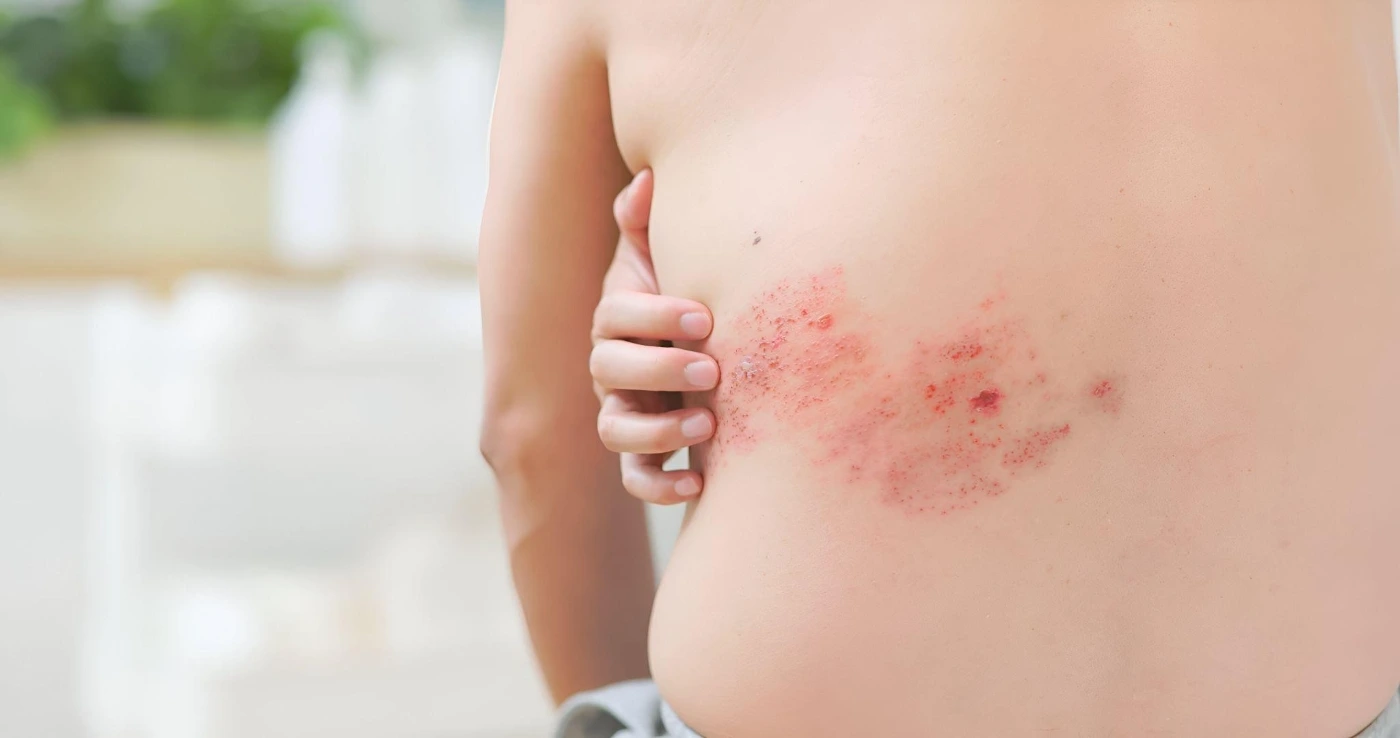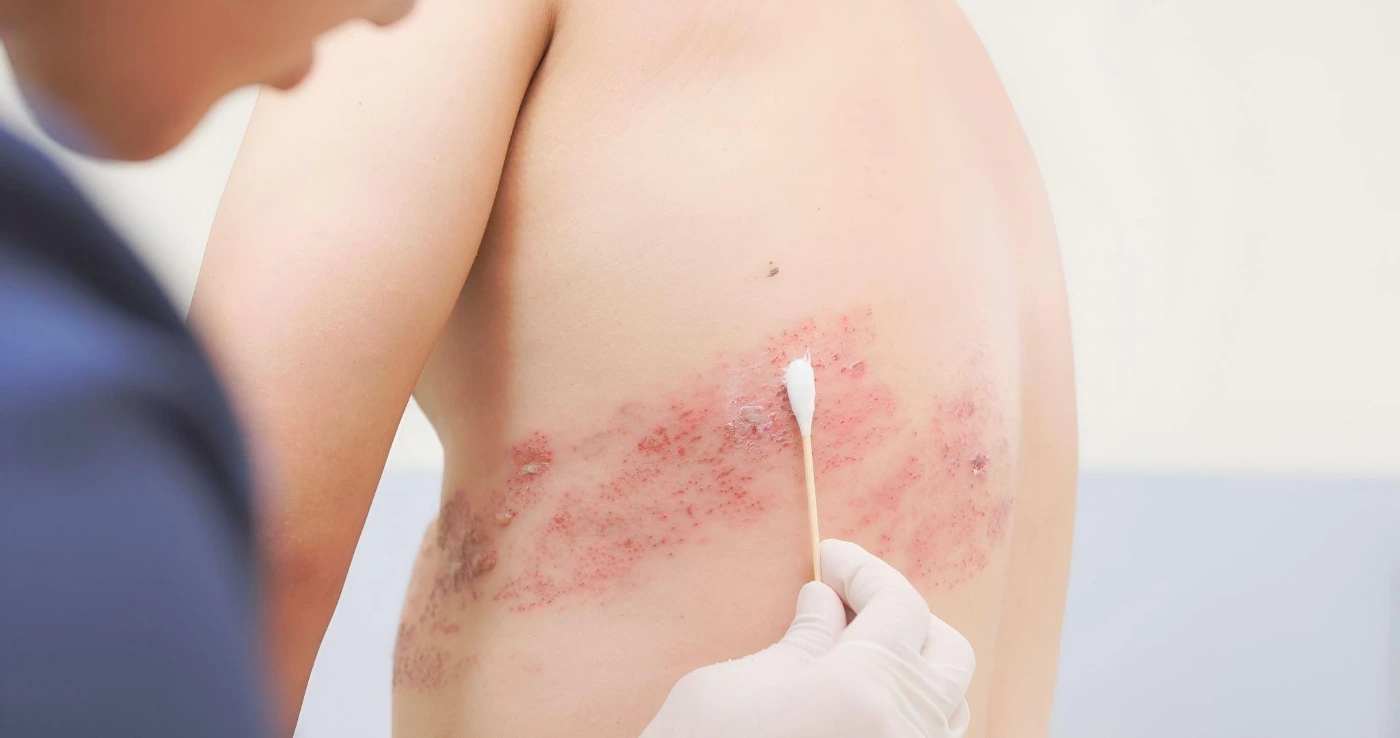Topics
What Is Shingles?
Shingles, or herpes zoster, is a viral infection caused by reactivation of the Varicella-zoster virus, the same virus that causes chickenpox. After recovering from chickenpox, the virus lies dormant in the nerve tissue and can reactivate later in life, often triggered by factors like stress, age, or a weakened immune system.
When the varicella zoster virus reactivates, it produces a painful rash and blisters, usually appearing on one side of the body. This localised rash is one of the hallmark symptoms of shingles and typically follows a nerve pathway, making it distinctive from other skin conditions.
This article will discuss the causes, symptoms, and risks of shingles in detail. In addition, it will also explain effective prevention and treatment measures. If you experience symptoms or are exposed to shingles, seek immediate treatment at Gleneagles Hospital to prevent complications and speed recovery.
Shingles Risk Factors: Who Is Most at Risk for Herpes Zoster?
1. Weakened Immune System
Individuals who have low immunity, such as those with chronic diseases including cancer or HIV, or those on immunosuppressive medications, are at an increased risk of developing shingles. A compromised immune system can make it easier for the varicella-zoster virus to reactivate and cause infection.
2. Age
Age plays a significant role in the likelihood of developing shingles. Individuals over 50 are at a higher risk, as immune function generally declines with age. The risk and severity of shingles increase as people age, particularly for those over 60, making vaccination and early treatment essential to prevent complications like post-herpetic neuralgia.

Symptoms of Shingles to Watch Out for
1. Burning or Shooting Pain, Tingling, or Itching
Early signs of shingles often involve unusual sensations such as burning pain, sharp shooting pain, or a tingling sensation in the area where the rash will later appear. These early symptoms may feel like a constant itch or irritation, which can make the affected area sensitive to touch. In some cases, people describe the pain as severe, resembling nerve damage or a deep internal ache.
2. Pain on One Side of the Body or Face
Shingles typically affects only one side of the body because the varicella-zoster virus reactivates in a specific nerve pathway. This is why the pain and subsequent rash do not cross the midline of the body. The one-sided pain is a key characteristic, helping distinguish shingles from other skin conditions.
3. Rash and Blisters
Several days after the initial pain and tingling, a rash develops. It starts as red patches that eventually form clusters of fluid-filled blisters. These blisters are similar in appearance to chickenpox but are confined to one nerve area, often forming a stripe-like pattern around one side of the torso or face. Over time, the blisters burst and crust over, typically healing within 7 to 10 days.
4. Localised Rash on the Body or Face
The rash commonly appears on the trunk, wrapping around one side of the body in a band-like pattern. On the face, the rash can affect areas near the eyes, ears, or mouth. Facial shingles may lead to more complications, such as vision problems or hearing issues if left untreated.
5. Widespread Rash (Rare Cases)
In individuals with weakened immune systems, the rash can spread across larger areas of the body, resembling a severe case of chickenpox. This is rare and indicates a need for immediate medical intervention due to the risk of complications.
6. Fever, Chills, Headache
A mild to moderate fever often accompanies shingles, indicating the body’s immune response to the reactivated virus. This symptom is typically more noticeable in the early stages, before the rash appears. Some individuals may also experience chills as their body temperature fluctuates in reaction to the viral activity, often accompanied by a general feeling of malaise. Headaches, ranging from mild tension headaches to more severe, migraine-like symptoms, can also occur as part of the systemic response to the virus.
Each person’s experience with shingles can vary, and some may have additional symptoms or more severe manifestations of the condition. Prompt treatment can help alleviate these symptoms and prevent complications.
Is Shingles Contagious?
Shingles is not contagious because it is caused by the reactivation of the varicella-zoster virus (VZV) already present in the body, rather than being acquired from another person. After someone recovers from chickenpox, the virus remains dormant in their nerve tissue and can reactivate later in life as shingles, often triggered by factors like ageing, stress, or a weakened immune system.
Unlike illnesses caused by newly introduced pathogens, shingles does not spread between people. However, the fluid from the blisters of a shingles rash can be transmitted to someone who has never had chickenpox or been vaccinated against it, causing them to develop chickenpox—not shingles. Since the virus is contained within the blisters, the risk of transmission is minimal if the rash is covered, and direct contact is avoided.

Shingles Prevention and Treatment Measures
Preventing shingles and seeking early treatment are crucial to reducing the risk of complications, including post-shingles neuralgia. The shingles vaccine is the most effective method to prevent the infection. The vaccine, in particular, is recommended for those over the age of 50 and has been shown to reduce the risk of shingles and post-shingles neuralgia by 90%.
Currently, there is no cure for shingles, but antiviral medications can be used to help reduce the severity, duration, and spread of the rash if taken within 72 hours of symptom onset. Pain relief medications can be prescribed to alleviate pain and discomfort associated with the infection, helping improve overall recovery.
By taking preventive measures like the shingles vaccine and starting treatment early, individuals can significantly reduce the severity and duration of symptoms.
Frequently Asked Questions
1. What Causes Shingles Outbreaks?
Shingles is caused by the reactivation of the varicella-zoster virus (the same virus that causes chickenpox) after it remains dormant in the body's nerve tissue. Factors such as a weakened immune system, stress, or aging can trigger the reactivation, leading to a shingles outbreak.
2. Do Shingles Cause Serious Complications?
Yes, some individuals may experience post-herpetic neuralgia, a condition in which chronic pain occurs after the rash clears. Other complications include vision problems if the rash occurs near the eyes, which require immediate medical attention to prevent permanent damage.
3. Does Shingles Go Away on Its Own?
While shingles may eventually heal on its own, the virus can cause severe pain and complications if left untreated. Prompt treatment with antiviral medications can help reduce the severity, duration, and spread of the rash and minimise the risk of complications.
4. What to Do if a Family Member has Shingles?
If a family member has shingles, it’s important to avoid direct contact with the rash to prevent spreading the varicella-zoster virus. Keep the rash covered and practice good hygiene. Anyone who has never had chickenpox or the chickenpox vaccine should avoid contact, as they could develop chickenpox (not shingles) if exposed.
5. Do Shingles Leave Scars?
A shingles rash can leave scars, especially if the blisters are scratched or infected. To avoid scarring, it is important to keep the affected area clean, avoid scratching and seek appropriate medical treatment to promote healing.
6. What Is the Most Common Treatment for Shingles?
The most common treatment for shingles includes antiviral medications, such as acyclovir, which help reduce the severity and duration of symptoms if started within 72 hours of symptom onset. Pain relief medications like ibuprofen or opioids may also be prescribed to manage pain, while topical creams can help soothe the rash.
7. What are the best steps to avoid infection?
The most effective way to prevent shingles is through vaccination. In addition, maintaining good hygiene practices can help reduce the risk of infection and transmission of the varicella-zoster virus.
Book an Appointment at Gleneagles Hospitals for Shingles Treatment
If you have any questions about shingles or are experiencing symptoms, contact us to make an appointment at the nearest Gleneagles Hospitals. Early diagnosis and treatment are crucial for effective shingles management. For general health checkups and screenings, please contact the nearest health screening centre to start your health journey with the right steps.








